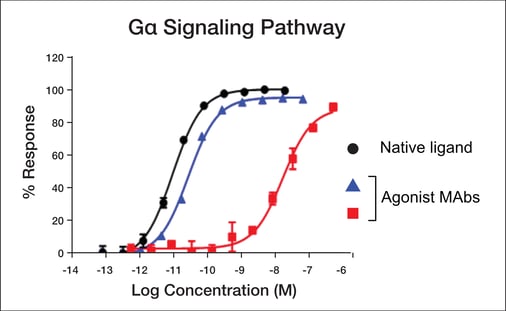Home » MPS Antibody Discovery » An agonist antibody targeting a challenging GPCR target
The Need: An agonist monoclonal antibody
G protein-coupled receptors (GPCRs) are a large diverse group of membrane proteins that are targeted by one-third to one-half of all drugs currently on the market, but are difficult targets for antibody discovery due to their complex membrane-spanning structures. Discovering an agonist antibody that not only binds the GPCR but also contacts the correct site on the protein in a way that triggers its activity is a daunting challenge. Merck approached Integral Molecular with a GPCR target of interest, with the goal of leveraging the MPS antibody discovery platform to obtain a high-affinity antibody with agonist properties.
The Solution: Chicken immunization with native-conformation antigen
Merck’s GPCR target required specialized antibody expertise and tools to obtain a high-affinity antibody with the desired agonist properties. Integral Molecular’s MPS Antibody Discovery platform contains the tools and know-how needed to go from immunization to delivery of preclinical lead antibodies against challenging targets. The MPS strategy for Merck’s target involved immunization of divergent chicken host animals with Integral Molecular’s Lipoparticles which present antigen in its native conformation for a robust immune response.
The Impact: A unique GPCR-activating antibody
Integral Molecular’s MPS platform delivered an antibody against a GPCR target for Merck with agonist activity similar to the native ligand. Scientists from Merck attributed this antibody discovery success to the unique CDR diversity generated in chickens that provided an interaction capable of activating a GPCR that no other rodent or human phage display derived antibodies could do. The use of a chicken immunization host was able to yield a pan-reactive antibody that binds to mouse, rat, dog, and non-human primate target orthologs, providing pharmacology and toxicology testing options in numerous easily accessible animal models.
The lead candidate was shown in follow-up studies to stimulate G𝛼 and Gβϒin a similar fashion to the native ligand, and pharmacodynamic assays demonstrated the desired functional activity in mice. Follow-up pharmacokinetic and pre-development assessments showed no major liabilities for the lead antibody.

These data were presented by Dr. Mas Handa Ph.D. (Merck), Director of Antibody Discovery, in 2022 at the Festival of Biologics and Discovery on Target Conferences.